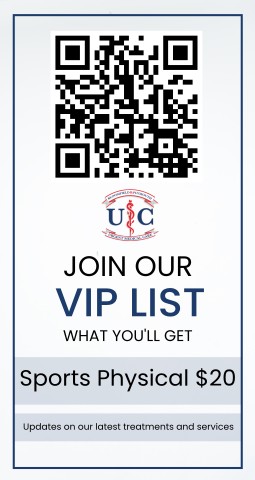Signs That You May Need an Electrocardiogram (EKG)
Understanding when to seek specialized heart care like an Electrocardiogram (EKG) is crucial for your health. An EKG is a simple, painless test that measures the heart’s electrical activity to reveal various heart conditions. Whether it’s unexpected chest pain, severe fatigue, or irregular heartbeats, recognizing these signs early can be key to preventing more serious cardiac issues. This brief guide will highlight several indicators suggesting that an EKG might be a necessary step in your healthcare routine. At Plymouth Urgent Care and Bloomfield Urgent Care, we provide trusted EKG testing. For more information, contact us today or schedule an appointment online. We have convenient locations to serve you in Plymouth, MI and Bloomfield Hills, MI.
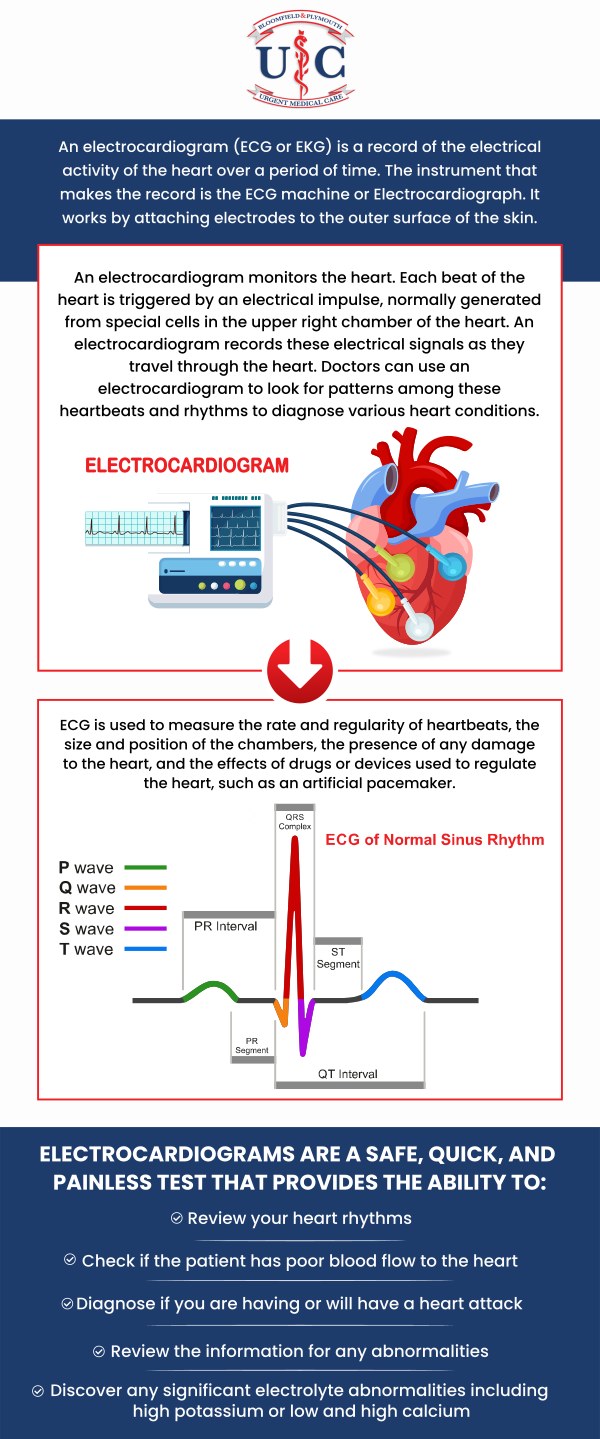
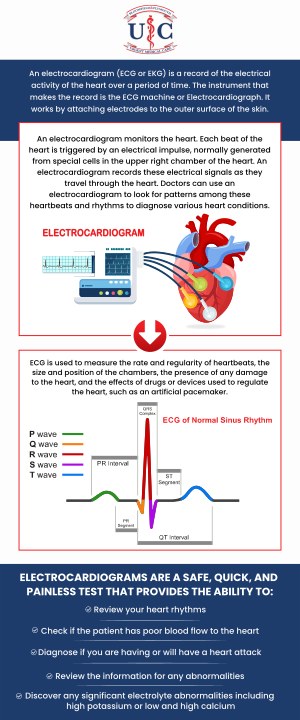
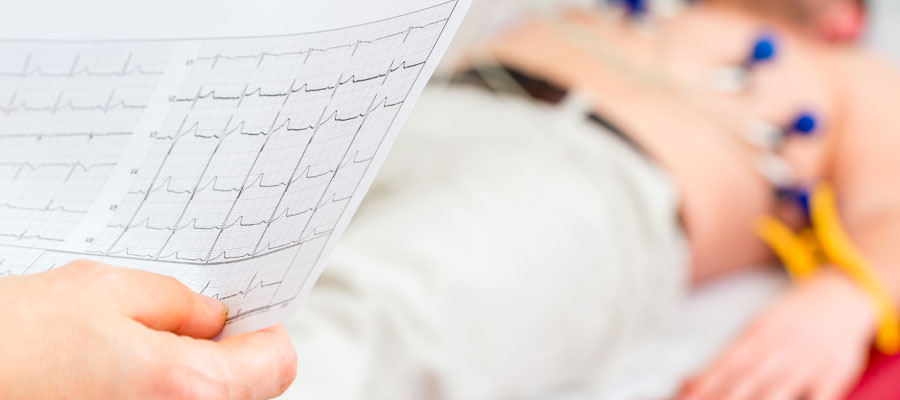
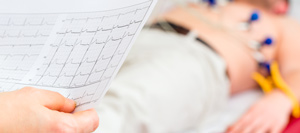
Table of Contents:
How Does an EKG Work?
What symptoms require an EKG?
When would someone need an EKG?
How to prepare for an EKG?
An Electrocardiogram (EKG) functions by detecting and recording the electrical signals generated by the heart each time it beats. During the test, small sensor patches known as electrodes are strategically placed on the patient’s chest, arms, and legs. These electrodes are connected to an EKG machine by lead wires. When the heart beats, it produces electrical impulses that travel through the heart muscle, triggering it to contract and pump blood. The EKG machine captures these impulses and translates them into graphical lines displayed on a monitor or printed on paper. This graphical representation allows healthcare providers to analyze the heart’s rhythm, speed, and regularity, thereby facilitating the diagnosis of various heart conditions, such as arrhythmias, heart attacks, and more.
Several symptoms signify the need for an Electrocardiogram (EKG), serving as warnings of potential heart-related issues. Experiencing unexpected chest pain or discomfort is one of the primary indicators, especially if it’s accompanied by nausea, dizziness, or shortness of breath. Severe fatigue or weakness without apparent cause, which persists over time, can also suggest heart problems that merit an EKG examination. Irregular heartbeats, whether they feel skipped, too fast, or too slow, are additional symptoms that shouldn’t be ignored. Shortness of breath not related to physical exertion and swelling in the legs or feet, indicating potential heart failure, also necessitate this diagnostic test. Lastly, a history of heart disease in the family, or pre-existing conditions such as diabetes or high blood pressure, increases the importance of monitoring for these symptoms and possibly undergoing an EKG to ensure heart health.
An EKG may be recommended for various reasons beyond the immediate symptoms one might experience. Often, it’s a preventive measure or part of a routine check-up for those with a family history of heart disease or for individuals with risk factors such as smoking, high cholesterol, diabetes, or hypertension. Physicians might also order an EKG if you’re starting a new exercise program, especially if you’re older or have been less active, to ensure your heart can handle the increased activity. Additionally, it’s a critical step before surgeries to assess the heart’s condition and to monitor the effectiveness of medications or devices used to manage heart diseases like arrhythmias. This diagnostic tool is invaluable for detecting heart conditions that may not always manifest through symptoms, ensuring early intervention and treatment.
Preparing for an Electrocardiogram (EKG) is straightforward with no special requirements involved. On the day of the test, wearing loose, comfortable clothing that can be easily removed is advisable since electrodes will be placed on your chest, arms, and legs. It’s important to avoid using lotions or creams on your skin where the electrodes will be attached, as these substances can interfere with the sensor’s ability to detect the electrical signals from your heart. If you’re on any medications, continue taking them as prescribed unless your healthcare provider instructs otherwise. Be sure to inform your doctor about all the medications and supplements you’re taking, as some substances can affect the results of your EKG. Lastly, relaxation before the test can help ensure more accurate results, so try to arrive at your appointment calmly and prepared.
At Urgent Medical Care Plymouth & Bloomfield, we are dedicated to providing top-notch heart care to our patients, ensuring early detection and management of heart-related conditions. Our skilled team is ready to guide you through the process of an Electrocardiogram (EKG) with ease and compassion. If you’re experiencing any symptoms that concern you or if you have risk factors for heart disease, don’t hesitate to reach out. Call us or book an appointment online today to take a proactive step toward monitoring and maintaining your heart health. Your well-being is our top priority, and we’re here to support you every step of the way. We serve patients from Plymouth MI, Bloomfield Hills MI, Livonia MI, Novi MI, Worden MI, Canton MI, Southfield MI, Troy MI, Farmington Hills MI and BEYOND.

Check Out Our 5 Star Reviews


Additional Services You May Like
▸Urgent Care
▸Covid-19 Testing
▸Primary Care
▸Occupational Health
▸Physicals
▸Digital X-ray
▸Lab Testing
▸Telemedicine
▸Ear Wax Removal
▸Auto-Accidents
▸Vision Testing
▸Pre Op Physicals

Additional Services You May Like
▸Urgent Care
▸Covid-19 Testing
▸Primary Care
▸Occupational Health
▸Physicals
▸Digital X-ray
▸Lab Testing
▸Telemedicine
▸Ear Wax Removal
▸Auto-Accidents
▸Vision Testing
▸Pre Op Physicals

